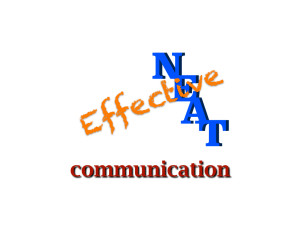
How much time do you invest in your choice of words? If you’re like me, you really want to get them right the first time — and you are a little impatient if you have to repeat them. We want to be known as effective communicators.
Yet, what are the rights words? We have to judge the moment . . . and the audience . . . and the culture . . . and the impact of the eventual soundbite that will be distilled from what we say.
And, for most of our communications, this all must be done at the speed of sound.
In this mini-series on “NEAT Communication,” we are looking at the four elements that set us apart as excellent communicators: Necessary, Effective, Accurate, and Timely. One element, without consideration of the other three, can be devastating to our meaning. The effectiveness of what we say or attempt to convey is part of a broader package.
 To be truly effective, ask yourself these three questions before speaking (or writing a text or email). It’s an easy exercise with dramatic potential.
To be truly effective, ask yourself these three questions before speaking (or writing a text or email). It’s an easy exercise with dramatic potential.
- Have I “listened to the end?” A major detractor to effective communication is our failure to fully hear the other side of a conversation. Don’t worry so much about when you can jump in. Pause. Reflect. If you’re not certain, ask curious questions.
- Do I want to nurture conversation or simply end it? Chances are, if you are wanting to end a conversation, your choice of words may be effective for that purpose. However, similar to the “win at all costs” approach to life, the lingering aura of negativity will limit your present relationships as well as those that will be preempted by your reputation. Respond in a way that keeps the conversation viable, even if you must interrupt it in the moment. Choose words that convey your thoughts in clear, but non-threatening language. A phrase that threatens only escalates the conflict.
- If I repeat what I am about to say, will it have the same meaning that I intended in the first moment? When confronted with their own hasty words, people often reply, “That’s not what I meant!” That sentence is not particularly effective, because it’s too late. (See the upcoming post on Timely.) After pausing and reflecting, speak slowly. Don’t be afraid of a little silence as you craft your meaning. If the other person is impatient, ask them for a moment to make your words right. In most cases, the first meaning assigned to your communication is the one that will survive.
Choice of words is a mixture of knowledge and wisdom. Words do matter and the right words will set you apart — and save your relationships and your reputation.
